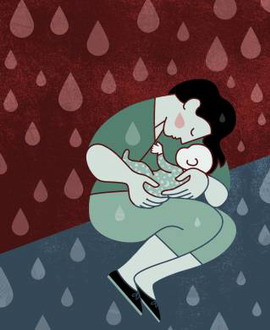
Having a baby is usually considered a joyous event, but all those dead-of-night feedings, pushy in-laws and general jitters can make life miserable for any new mom. To make matters worse, some women experience serious post-natal depression, which leads to a vicious cycle of fatigue, fights and even more stress. This can be particularly distressing for family members caught in the crossfire – a stressed-out mama can turn from “sweet-and-nurturing” to “hellfire-and-brimstone” at the drop of a hat.
Thus for new parents-to-be the recent announcement by US researchers that “measuring levels of a hormone midway through pregnancy may predict a woman’s risk of postnatal depression” should be welcome news. The study focused primarily on the relationship between post-natal depression, which usually “starts four to six weeks after giving birth” and “affects around 10 to 15 percent of mothers,” and “pCRH (placental corticotropin-releasing hormone)” – a type of hormone that produces cortisol, which the body produces in greater amounts during pregnancy to help mothers-to-be deal with stress.
Problems can arise when pCRH levels naturally “dip after birth,” a phenomenon which is theoretically more pronounced in women with higher levels, thus producing increased bouts of stress. You can read more about the study results here and here, and if you’re a new dad-to-be, considered yourself forewarned.
Mothers, of course, aren’t the only ones who have to deal with stress – kids, especially middle-schoolers, are notorious for acting up and lashing out (once again, you can blame all the hormones). This has become such a problem in some Chinese schools (not to mention in the US where school shootings have become seemingly and tragically commonplace) that a middle school in Jinan has even taken the extreme measure of setting up an “emotion venting room” where punching bags painted with the faces of the faculty and staff (including, more notably, the headmaster) were placed that “students could hit to vent their feelings of anger, resentment, frustration and depression.” The overall effectiveness of such a measure remains unclear, but news of this and other related news are a sure sign of increasingly desperate times.



